
Artifishal reveals the grim impact humanity is having on wild salmon populations.
Documentaries about the future prospects of our planet have, by necessity, become increasingly alarming of late. Yet it’s taken a national treasure like Sir David Attenborough to raise the alarm for the wider populous – and big business – for them to sit up and take note. Finally, we are all now having to consider our use of plastic and what it does to our oceans.
This new film from eco-friendly outfit Patagonia joins a wider chorus of environmental concerns, here focusing on the plight of wild salmon off the west cost of the US. For years, farmed fishing ‘hatcheries’ were viewed as a solution to preserving wild fish populations affected by dam building and rerouted rivers. Yet the reality of dwindling numbers in the oceans points to a manmade disaster born out of corporate hubris that defies logic.
Director Josh “Bones” Murphy’s film explores how these hatcheries actually reduce wild populations dramatically, since the farm-generated, often-mutated fish aggressively fight their wild counterparts for habitat. As a result, the rich nutrients from a wild fish’s carcass which would usually feed back into the ecosystem are being lost at an alarming rate.
Murphy’s film unpacks a case that’s been out in the public domain for nearly 40 years. When Mt St Helens erupted in 1981, wild salmon populations, initially thought destroyed by the lava, actually shot up as a result. As the fish farming industry has grown around it, so those populations have dramatically dropped. The message is simple. Nature doesn’t destroy its own. Only man can do that.
A range of talking heads – from environmentalists to tribal elders to keen fishermen – expand on the issues and frustrations their communities face, when dealing with a problem that involves government agencies, big business and tax-payer-funded schemes that are clearly not working. The corporations, not surprisingly, go on the offensive to defend their position.
Further still, the plight of wild salmon has a very real knock-on effect for communities reliant on them for survival – both in the western states of Washington, Oregon and northern California, and in areas of Northern Europe like Norway. Yurok elders share their exasperation at the situation. Their tribe’s intrinsic relationship with salmon is illustrated by way of bespoke animation. Without the fish, the tribe believe they are doomed.
There isn’t much to celebrate at this point, although a legislative ray of hope signals there may yet be a light at the end of the tunnel. Following protests that attracted concerned locals from all walks of life, government passed a series of bills banning the use of open-farming hatcheries in Washington state by 2021, thereby reversing further pollution of wild fish populations. It’s a positive, vital first step. But clearly, there is much work yet to be done.
Appropriately, the big question – that is, what world are we going to leave for our children? – is left to the Yurok people themselves, on the front line of the dwindling salmon population. They may have survived the horror of western ‘settlement’, yet could still be wiped out by a more insidious fate. Attenborough may not be on hand to help push this out to the masses, but their powerful and timely message adds to the need for generational change in positions of power, which clearly can’t come soon enough. The year 2020 may yet offer some hope.
Published 30 Apr 2019

Scenes of mass devastation have rarely looked so gorgeous, but this hectoring doc could’ve done something better with them.

An impassioned Al Gore returns to explain (again) how climate change is killing the planet and what we can do to save it.

Jeff Orlowski’s documentary explores why the world’s coral reefs are dying at an alarming rate.